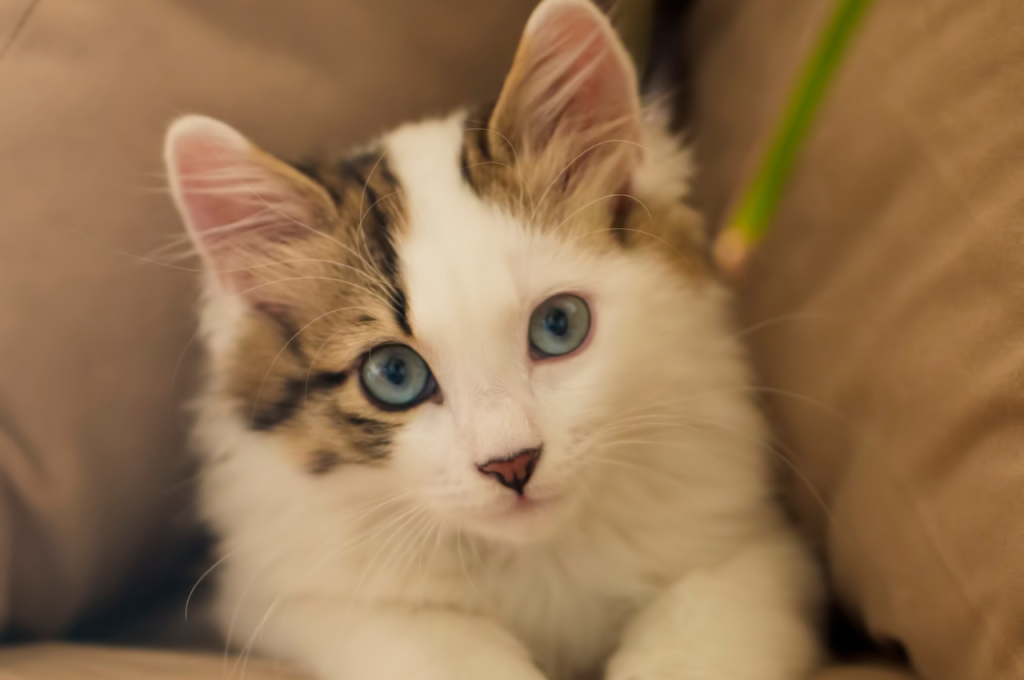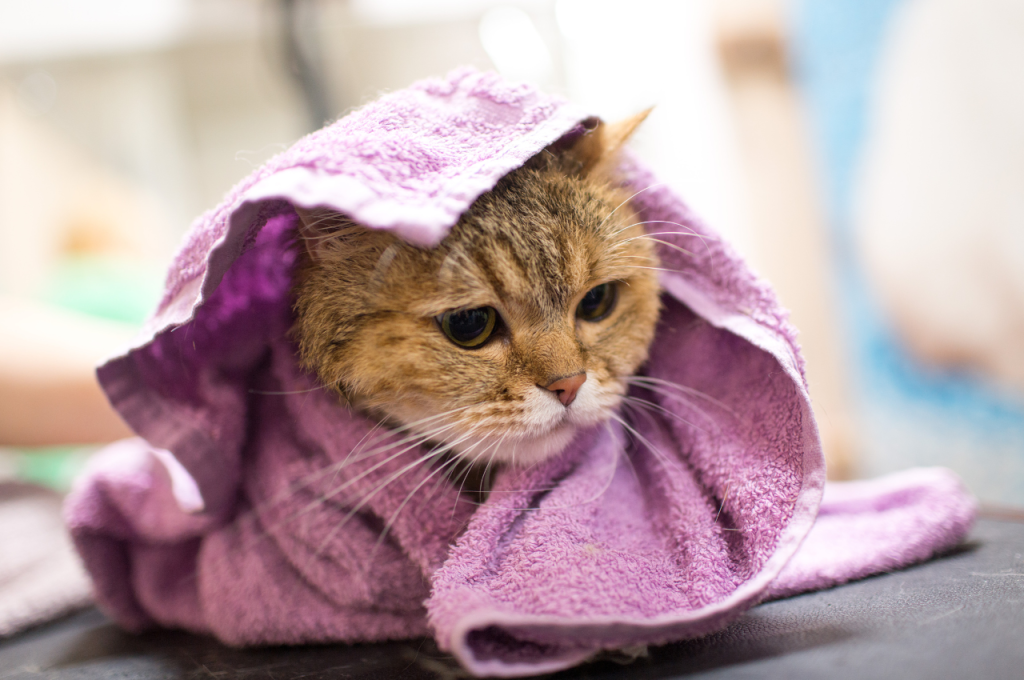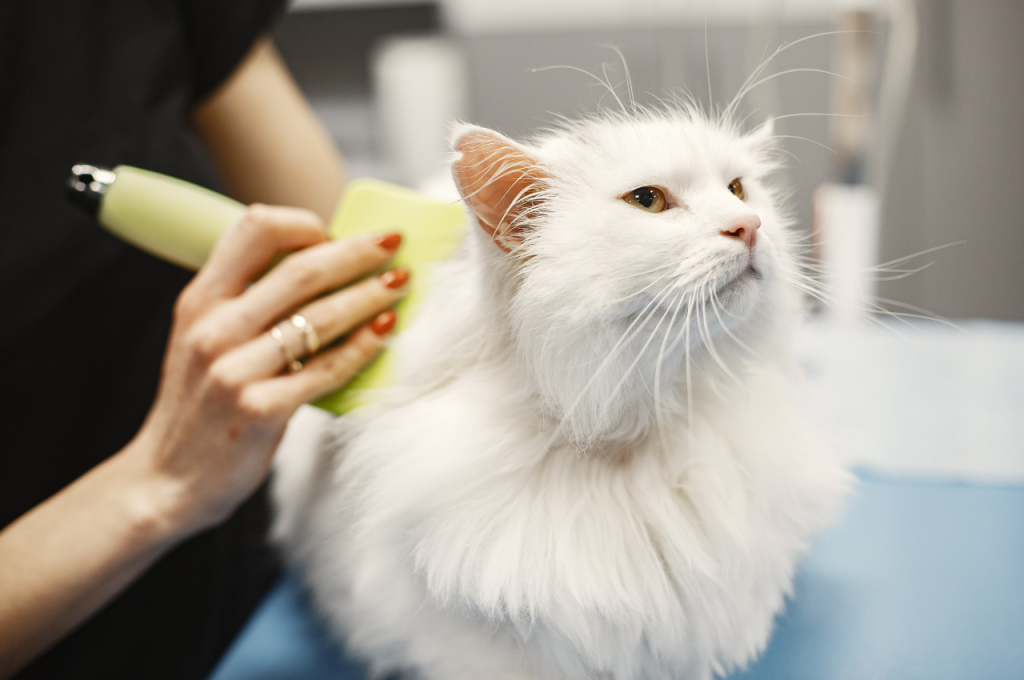Your cat smells good because they spend a lot of time grooming themselves, which distributes natural oils throughout their fur. This grooming also helps remove dirt and bacteria, leading to a pleasant scent.
Cats have a keen sense of smell and use scent to communicate with other cats, so they take great care in keeping themselves clean and smelling good. As cat owners, we may sometimes wonder why our feline friends have such a pleasant scent. It’s not uncommon to catch a whiff of our cats and feel pleasantly surprised by their scent. While some cats may have a stronger odor due to certain health conditions or hygiene issues, in general, cats smell good because of their grooming habits. We’ll explore why cats smell good, the benefits of grooming, and how to keep your cat smelling fresh.
The Enigma of Feline Fragrance
Cats have a unique scent that many find surprisingly pleasant. The reason behind this delightful aroma lies in their grooming habits and the intriguing science that governs it.

Cats’ Natural Grooming Habits
Cats are meticulous groomers, spending up to half of their waking hours licking themselves clean. This grooming routine not only keeps their fur clean but also distributes natural oils that contribute to their pleasing scent.
The Science Behind The Scent
The secret to a cat’s appealing fragrance lies in the sebaceous glands located at the base of their hair. These glands secrete oils that are spread across the fur during grooming, creating that distinctive and pleasant smell we associate with our feline friends.
Cats and Their Mysterious Scent Glands
Have you ever buried your face in your cat’s fur and thought to yourself, “Why does my cat smell so good?” The answer to this lies in the mysterious world of a cat’s scent glands. These glands play a crucial role in how cats communicate with each other and with their human companions.
Location and Function
Cats have scent glands located in various parts of their bodies, including their cheeks, forehead, tail, and paw pads. These glands are responsible for secreting pheromones, which are chemical substances that convey information to other cats and creatures in their environment.
How Glands Contribute to Their Scent
The scent glands contribute to the unique and pleasant aroma that many cat owners love. When cats rub against objects or people, they are depositing their scent from these glands, marking their territory, and claiming ownership. This behavior is a way for them to establish familiarity and security in their surroundings.
The Role of Diet in a Cat’s Scent
Cats are known for their cleanliness and pleasant smell. Have you ever wondered why your cat smells so good? One important factor that influences a cat’s scent is its diet. The food they consume plays a significant role in their body odor. Let’s explore the impact of nutrition on a cat’s scent and discover which foods can influence their body odor.
Impact of Nutrition
The saying “you are what you eat” applies to cats as well. The type of food a cat consumes directly affects their body odor. A well-balanced and nutritious diet can contribute to a pleasant smell, while a poor diet can result in an unpleasant odor. Proper nutrition helps maintain a cat’s overall health, including their skin and coat condition, which significantly impacts their scent.
Foods That Influence Body Odor
The specific foods that cats consume can influence their body odor. Here are some examples:
- Protein-rich foods: High-quality protein sources like chicken, fish, and turkey can contribute to a healthier coat and reduce body odor. These proteins provide essential amino acids that are necessary for healthy skin and fur.
- Omega-3 fatty acids: Foods rich in omega-3 fatty acids, such as salmon and flaxseed, can improve skin health and reduce inflammation, leading to a healthier coat and a more pleasant scent.
- Digestible carbohydrates: Opting for easily digestible carbohydrates like rice or sweet potatoes can help promote a healthier digestive system, reducing the likelihood of unpleasant odors arising from the cat’s body.
- Hydration: Ensuring your cat stays hydrated by providing fresh water can also contribute to a pleasant scent. Sufficient hydration helps maintain healthy skin and coat, reducing the chances of dryness or excessive oiliness that can lead to unpleasant smells.
By paying attention to your cat’s diet and providing them with high-quality food that meets their nutritional needs, you can help ensure they maintain a pleasant scent. Remember, a healthy diet not only benefits their overall well-being but also contributes to their delightful aroma.
Feline Pheromones: The Invisible Markers
Feline pheromones are invisible markers that give cats their unique scent. These pheromones are important for communication and can have a calming effect on cats. So, the next time you wonder why your cat smells so good, it’s because of their natural pheromones.
Understanding Pheromones
When it comes to why your cat smells so good, the answer lies in the fascinating world of feline pheromones. These invisible markers play a crucial role in communication and are responsible for the unique scent that emanates from your furry friend.
Communication Through Scent
Unlike humans who primarily rely on verbal communication, cats communicate through a combination of body language, vocalizations, and scent. Feline pheromones, which are secreted by various glands in their body, serve as a form of chemical communication.
These pheromones act as invisible markers, conveying information about your cat’s territory, emotions, and even their overall well-being. By leaving their scent on objects and surfaces, cats are able to establish a familiar and secure environment.
The pheromones emitted by your cat can also act as a calming agent. For example, when your cat rubs its face against your leg or furniture, it is depositing pheromones that signal a sense of security and familiarity. This behavior is known as “bunting” and is a way for cats to mark their territory and communicate with other felines. Understanding the significance of feline pheromones can help you better comprehend your cat’s behavior and strengthen the bond between you and your furry companion. By creating an environment that promotes their natural scent, you can ensure your cat feels safe, secure, and content.
So, the next time you catch a whiff of your cat’s unique scent, remember that it’s not just a pleasant fragrance but a complex language of communication that your feline friend relies on.
Bathing Behaviors: Less is More
Many cat owners wonder why their feline friends always seem to smell so good. The secret lies in cats’ natural grooming habits, which make them self-cleaning marvels. Understanding why cats rarely need baths can help you appreciate their unique hygiene routine.

Why Cats Rarely Need Baths
Cats are meticulous groomers, and their tongues act as a built-in washcloth, efficiently cleaning their fur. Unlike dogs, cats produce natural oils that keep their coats healthy, shiny, and odor-free. Their fastidious grooming behavior is often enough to maintain a fresh scent without the need for baths.
Self-cleaning Marvels
One of the reasons cats rarely need baths is because they are self-sufficient when it comes to hygiene. Their licking and grooming habits not only keep them clean but also help distribute natural oils throughout their fur, promoting skin health. Cats are experts at keeping themselves clean through their meticulous grooming routines.
Environmental Influences on Cat Smell
As a cat owner, you may have noticed that your feline friend has a distinct smell that can range from pleasant to overpowering. While a cat’s diet and grooming habits can affect their scent, there are also environmental factors that can contribute to their aroma. Let’s take a closer look at some of the ways that indoor vs. outdoor living, interaction with humans and other animals, and other environmental factors can influence a cat’s smell.
The Effect of Indoor Vs. Outdoor Living
Cats that live exclusively indoors may have a different smell than those that spend time outside. Indoor cats are typically exposed to a more limited range of scents and may have a more consistent aroma. On the other hand, outdoor cats have the opportunity to explore a wide variety of environments and may pick up new scents along the way.
Additionally, outdoor cats may encounter other animals, such as dogs, that can affect their scent. This can be especially true if the cat has a close relationship with the other animal, such as grooming or cuddling with them.
Interaction with Humans and Other Animals
The way that cats interact with humans and other animals can also have an impact on their smell. For example, cats that spend a lot of time cuddling with their owners may pick up the scent of their owner’s perfume or cologne. Similarly, cats that interact with other animals may pick up their scent as well.
It’s also worth noting that cats that live in multi-cat households may develop a group scent. This can be especially true if the cats spend a lot of time grooming each other or sleeping together. While the scent of a single cat may be relatively mild, the combination of multiple cats can create a more noticeable aroma.
Understanding the environmental factors that can affect a cat’s smell can help you better understand and appreciate your feline friend. Whether your cat is an indoor-only cat or spends time exploring the great outdoors, their scent is a unique reflection of their experiences and interactions.
Genetic Factors and Breed Variations
When it comes to the delightful scent of our feline friends, genetic factors and breed variations play a significant role. Understanding the unique smell of your cat can provide fascinating insights into their ancestry and genetics.
Breed-specific Scent Profiles
Different cat breeds possess distinctive scent profiles due to their genetic makeup. Some breeds may exude a sweet, pleasant odor, while others emit a muskier fragrance. These variations are a result of specific genetic traits that contribute to the production of oils in the skin and coat.
The Genetics of Smell
The olfactory system of cats is closely linked to their genetics. Genes influence the production of pheromones and other scent-related compounds, giving each breed its unique olfactory identity. Selective breeding has also led to the development of certain scent characteristics in different cat breeds.
Maintaining That Pleasant Feline Fragrance
Cats have a distinct and pleasant smell that many owners find delightful. The good news is, that you can help your furry friend maintain that alluring fragrance with proper grooming techniques and a suitable diet. By understanding how to care for your cat’s hygiene and dietary needs, you can ensure they continue to emit that wonderful aroma that we all love.
Proper Grooming Techniques
Proper grooming is essential for maintaining your cat’s pleasant scent. Regular brushing helps remove loose fur and prevents mats, which can trap odors. Additionally, bathing your cat with a gentle, feline-friendly shampoo can help keep them clean and fresh. Remember to trim your cat’s nails regularly to prevent the accumulation of dirt and bacteria that can contribute to unpleasant odors. Maintaining a clean litter box and regularly cleaning your cat’s bedding also play a crucial role in preserving their delightful aroma.

Choosing The Right Diet
The food your cat consumes directly affects their body odor. Opt for high-quality cat food that contains essential nutrients and is free from artificial additives. A balanced diet promotes a healthy coat and skin, which can contribute to a pleasing scent. Additionally, ensure your cat has access to fresh water at all times to help flush out toxins and keep them hydrated, which can also impact their natural fragrance.
Conclusion
Understanding your cat’s scent is an important part of pet ownership. By maintaining good hygiene and regular grooming, you can keep your feline friend smelling fresh and clean. Remember, a pleasant-smelling cat is a happy and healthy cat, and your bond will only grow stronger with proper care.
